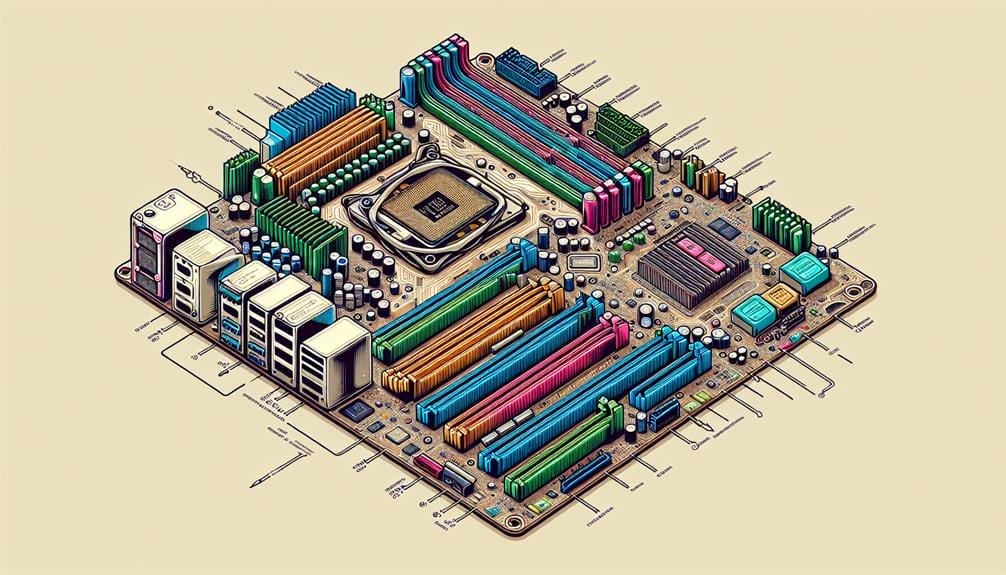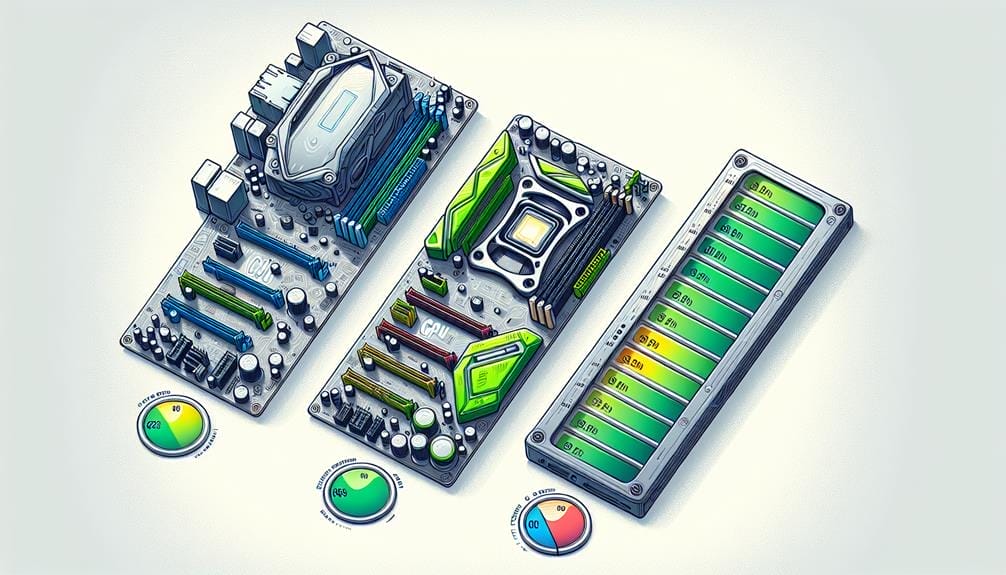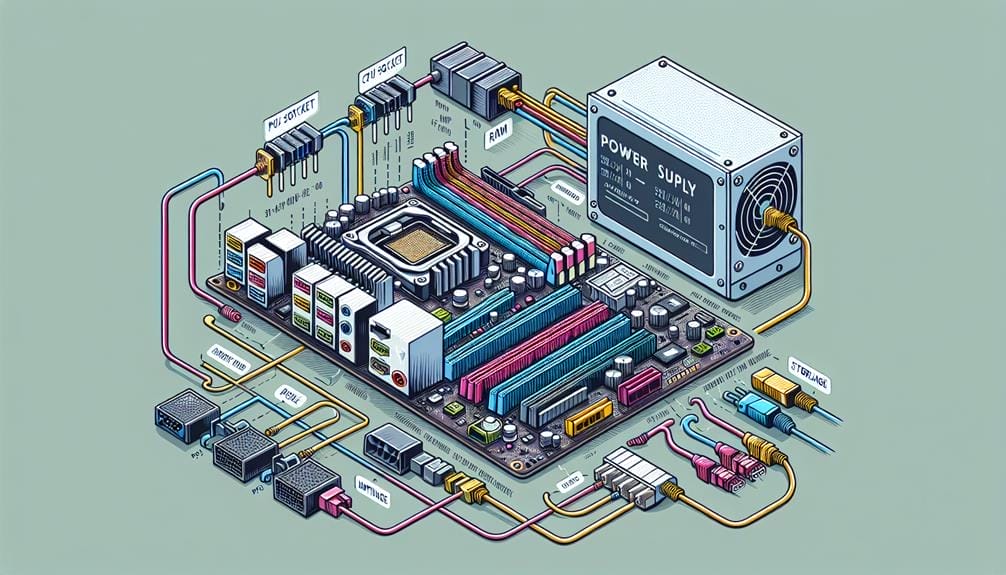Unveiling Motherboard Power Consumption Mysteries

The continuous progress in technology keeps the discussion about how much power motherboards use both interesting and pertinent among computer hobbyists and experts alike. The role a motherboard plays in the total energy consumption of a computer is complex and often seen as mysterious, influenced by various factors that determine its energy requirements.
Understanding these complexities is crucial for maximizing system efficiency and stability. By shedding light on the enigmatic realm of motherboard power consumption, this discussion aims to offer insights and guidance that will enable individuals to make informed decisions and construct systems that strike the delicate balance between performance and energy efficiency.
Key Takeaways
- Modern motherboards typically consume between 25-80 Watts of power.
- The maximum power supplied by a 24-pin motherboard power cable is 300 Watts.
- High-end motherboards may require more power due to features like RGB lighting and improved VRMs.
- Motherboards are unlikely to be the cause of power supply upgrade needs in a PC.
Understanding Motherboard Power Consumption

The power consumption of a motherboard is a critical aspect in understanding the overall energy requirements of a computer system. Factors affecting motherboard power efficiency include the chipset, VRMs, expansion cards, and additional features like RGB lighting. Measuring motherboard power consumption accurately is essential for optimizing system performance and ensuring that the power supply unit (PSU) meets the demands of the system.
Components such as GPUs and CPUs can have higher power consumption, but the motherboard plays a crucial role in distributing power to these components. Ensuring that the PSU provides at least 10% headroom over the system's maximum wattage is essential for efficiency and stability.
Understanding the intricacies of motherboard power consumption is fundamental for building and maintaining a balanced and efficient computer system.
Factors Affecting Motherboard Power Draw
In exploring the intricacies of motherboard power consumption, an examination of the factors influencing its power draw becomes paramount for optimizing system performance and stability.
Factors Affecting Motherboard Power Draw
- Measuring motherboard power draw accurately
- Accurate measurement tools and techniques are essential for understanding the real power consumption of a motherboard under different loads and configurations.
- Optimizing power efficiency in motherboard design
- Efficient power delivery and utilization of components, such as VRMs and chipsets, play a vital role in minimizing power draw and maximizing overall system efficiency.
- Impact of connected components
- The type and number of connected components, such as expansion cards and storage devices, can significantly influence the motherboard's power draw.
- Thermal management
- Effective thermal management solutions, including heatsinks and fans, can impact power draw by ensuring optimal operating conditions for the motherboard components.
Comparative Power Consumption in PC Components

Comparing power consumption among PC components reveals varying levels of energy utilization and underscores the significance of efficient resource allocation in system design.
Power efficient motherboard designs play a crucial role in optimizing overall energy consumption. Energy saving techniques for PC components, such as efficient voltage regulation and power management, are essential for reducing the environmental impact and operational costs.
Motherboards, acting as the system's backbone, have relatively low power consumption compared to high-power components like GPUs and CPUs. However, the overall power consumption of a PC is influenced by the combination of components.
Therefore, a balanced approach to component selection, including power efficient motherboard designs, is essential for achieving an optimized and sustainable power consumption profile in PC systems.
Impact of Motherboard on Overall PC Power Usage
Having examined the significance of power efficient motherboard designs in optimizing overall energy consumption, the impact of motherboards on the overall power usage of a PC becomes a focal point in understanding the dynamics of energy utilization in system design.
Impact of Motherboard on Overall PC Power Usage
- Motherboard Power Efficiency
- Efficient motherboard designs contribute to lower overall power consumption.
- Optimizing Motherboard Power Consumption
- Proper configuration and utilization of power-saving features can minimize the motherboard's power draw.
- Motherboard as System Backbone
- The motherboard's role in connecting components influences overall power usage.
- Scalability and Power Supply Requirements
- Properly scaled motherboards are unlikely to necessitate power supply upgrades.
PSU Wattage Recommendations for PC Builds

When determining the appropriate PSU wattage for a PC build, it is essential to calculate the total power consumption of all components and allow for a 10% headroom to ensure optimal efficiency and performance. This ensures that the power supply unit (PSU) can handle peak loads and provides longevity to the components. The table below outlines the recommended PSU wattage for different PC builds, considering the power consumption of essential components.
| PC Build Type | Recommended PSU Wattage |
|---|---|
| Entry-level | 300-400W |
| Mid-range | 450-600W |
| High-end | 750W and above |
| Enthusiast/Gaming | 850W and above |
| Workstation | 1000W and above |
Proper wattage allocation is crucial for power supply efficiency and the overall stability of the PC. It is important to select a PSU that meets the demands of the components to ensure consistent and reliable performance.
Addressing Concerns About Motherboard Power Usage
From determining the appropriate PSU wattage for PC builds to addressing concerns about motherboard power usage, understanding the power requirements of essential components is fundamental to ensuring optimal efficiency and performance in a PC system.
Addressing Concerns About Motherboard Power Usage:
- Analyzing motherboard power efficiency
- Understanding the power consumption range of modern motherboards (25-80 Watts).
- Identifying power-intensive features in high-end motherboards, such as RGB lighting and improved VRMs.
- Exploring power saving features in modern motherboards
- Investigating the role of motherboards as the backbone of a PC with low processing power.
- Examining the impact of heatsinks and fans on power consumption of motherboard components.
Conclusion
In conclusion, a thorough understanding of motherboard power consumption is crucial for optimizing system performance and energy efficiency.
By unraveling the complexities of power draw and considering the interplay with other high-consumption components, PC enthusiasts can make informed decisions when selecting power supply units and building systems.
This knowledge empowers individuals to strike a delicate balance between performance and energy efficiency, ultimately leading to more efficient and reliable PC systems.

